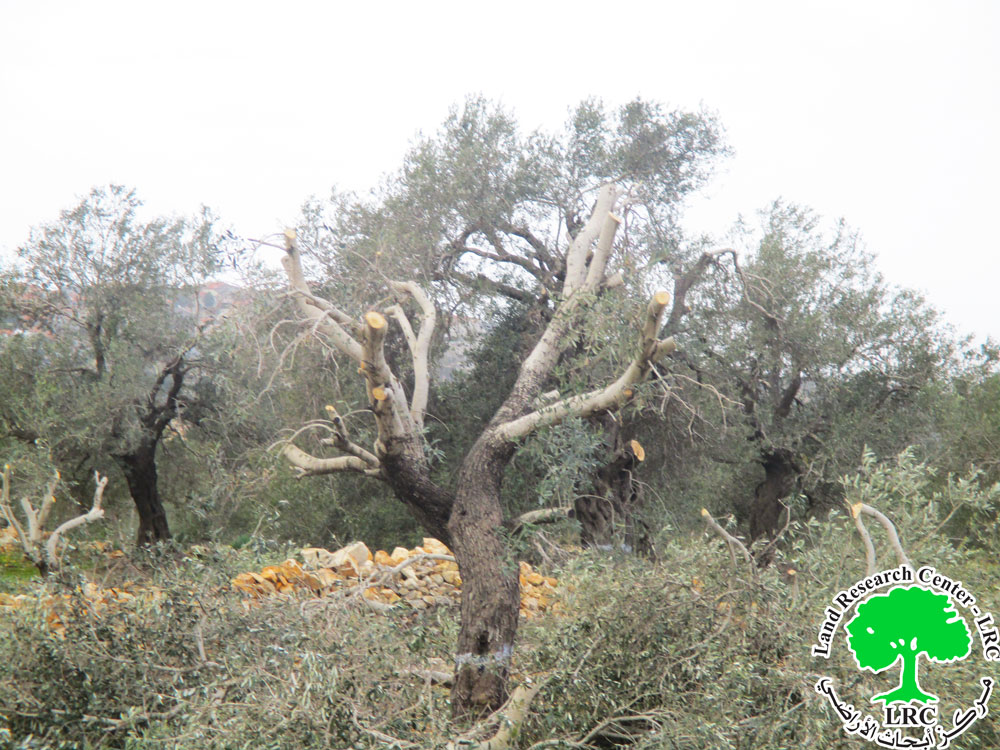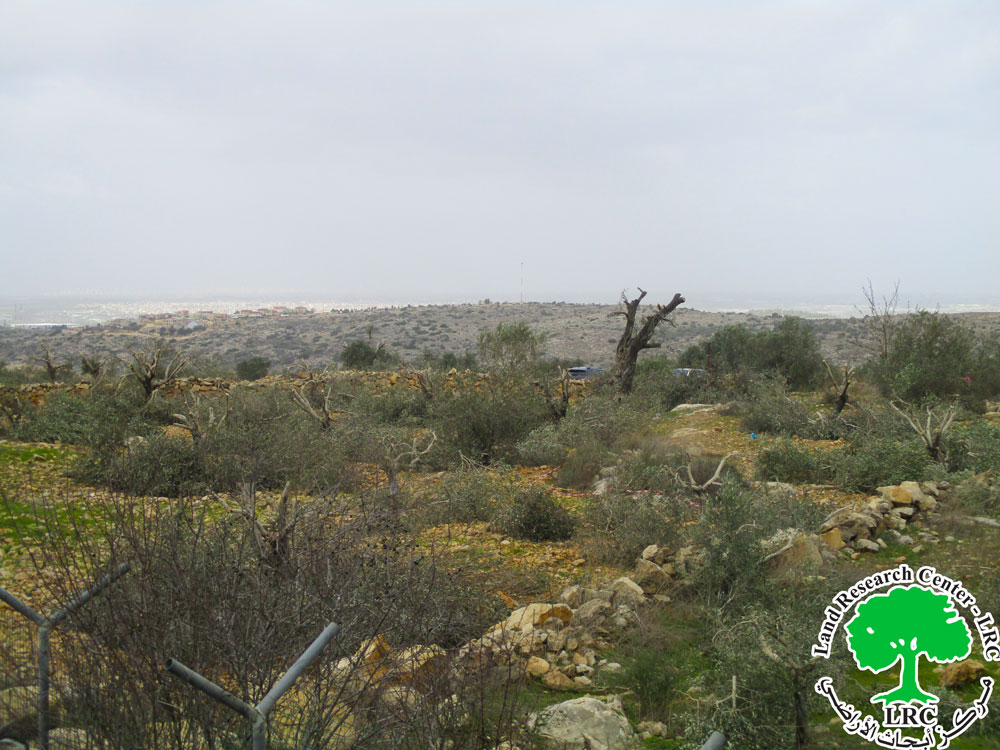As Olive Harvest Season Approaches: Settlers from "Nefe Nehemia" Cut Down Olive Trees in Iskaka Village/ Salfit Governorate
- Violation: Cutting and damaging olive trees.
- Location: Iskaka Village, Salfit Governorate.
- Date of Violation: September 11, 2024.
- Perpetrator: The "Neve Nehemia" settlement outpost.
- Affected Party: Farmer Zuhair Jamil Rizq Abdul-Razziq.
Description:
On the evening of Wednesday, September 11, 2024, a group of settlers stormed the "Haraeq Abu Ramadan" area, located east of Iskaka village in Salfit Governorate.
It is believed that the settlers came from the "Nefe Nehemia" settlement outpost and proceeded to cut and damage 60 olive trees, aged 40 years. The trees were harmed by cutting their branches, causing partial damage, just before the start of the current olive harvest season.
It is worth noting that the damaged olive trees belong to farmer Zuhair Jamil Rizq Abdul-Razzaq, who supports a family of 9, including 3 females and 2 children.
The affected farmer shared with a researcher from the LRC:
"I own a 11-dunum agricultural plot in the Haraeq Abu Ramadan area, planted with 40-year-old fruit-bearing olive trees. This land has been passed down through generations, and every year, I harvest olives, producing about 300 kilograms of olive oil annually.
However, two years ago, the occupation expanded the 'Nefe Nehemia' settlement outpost onto the lands of Iskaka village. Since then, we have faced continuous settler attacks and restrictions aimed at seizing our land. A colonial road was recently carved near my land a few months ago.
Following the events of October 7, settlers closed off the entire area, preventing us from cultivating the land or harvesting olives. Recently, I was shocked to find that settlers had cut the branches of my trees just before the olive harvest season. This has severely affected us, as this year's oil yield will be very low.
Despite these challenges, I am determined to stay and access my land. If I abandon it, settlers will fully seize it and establish residential settlement units."
It should be noted that the initial establishment of the colonial outpost "Nefeh Nahmiah" began in 2003 when a group of extremist settlers from the "Rehalim" settlement, which occupies the lands of the Palestinian villages of Yatma and Yasuf, took control of a piece of land that the occupation claimed as government property. The settlers set up several tents there, and since then, there has been a noticeable increase in the frequency of attacks on farmers in the region. The situation then evolved into the creation of a new colonial outpost by adding several mobile homes. In 2009, the occupation began constructing a colonial road to serve this outpost. Today, settlers, in light of the world’s distraction from what is happening in the occupied territories and under a politically extreme government, are attempting to legitimize colonial activities in the West Bank, including this illegal outpost, which is expanding its influence and establishing infrastructure to support its development as part of the broader efforts to Judaize the land in the Salfit Governorate, which now contains 23 Israeli settlements, compared to 18 Palestinian residential communities.
Introduction to the village of Iskaka:
Iskaka village is located 6 km to the northeast of the city of Salfit. It is bordered to the north by the village of Jama'in, to the west by the city of Salfit, where the "Ariel" settlement is located on its western lands, and to the east by the "Shefut Rahel" settlement. To the south, the village is bordered by the village of Amuriya.
The population of Iskaka was 1,198 people as of 2017. The total area of the village is 5,474 dunams, of which 217 dunams are designated for the village's built-up area.
The "Ariel" settlement, established in 1978, confiscated 198 dunams of the village's land and is home to 16,053 settlers.
Additionally, bypass roads have seized more than 40 dunams of land.
According to the Oslo Accords, the village's land is classified into areas (B and C). Area B constitutes 27% of the land, while the larger portion, Area C, which is under full Israeli occupation control, constitutes 73%. The areas are distributed as follows in dunams:
- Area B: 1,491 dunams
- Area C: 3,983 dunams
Legal Commentary:
The Palestinian environment, in general, is subject to numerous environmental violations by the Israeli occupation, disregarding all international and national laws and conventions related to the protection of environmental rights. The right to live in a clean and healthy environment is an inherent human right since the dawn of humanity. Despite this, the occupation often tries to present itself as being concerned about international environmental issues, even though it has signed major environmental protection agreements, including the Basel Convention in 1989, the Rotterdam Convention in 2008, the Stockholm Convention in 2001, and the Ramsar Convention in 1971, as well as air quality and climate protocols. However, Israel continues to violate all these treaties without accountability or oversight.
In addition to the provisions regarding the right to enjoy a clean and healthy environment for those living under military occupation, according to international laws, conventions, and treaties, such as the International Covenant on Economic, Social and Cultural Rights, adopted by the United Nations General Assembly in Resolution 2200 A (d-21) on December 16, 1966, Article 1, Paragraph 2 states:
"... All peoples have the right to freely pursue their economic, social, and cultural development, and to freely dispose of their natural wealth and resources without prejudice to any obligations arising from international economic cooperation based on the principle of mutual benefit and international law. In no case may a people be deprived of its own means of subsistence..."
There is no doubt that the violations carried out by the Israeli side violate the laws of the "occupying power" itself, in addition to other legal frameworks. Referring to the details of this case, the Israeli Penal Code of 1977 and its amendments stipulate that any act of trespassing on someone else's property to commit a crime punishable by law is illegal. Article 447 of the Penal Code states:
"Anyone who does any of the following with the intent to intimidate, insult, or harass the property owner, or to commit a crime, shall be sentenced to imprisonment for two years:
(1) Enters or crosses the property; (2) After entering the property legally, remains there illegally.
(b) A crime is committed under this section when the offender carries a firearm or a cold weapon, and the penalty is imprisonment for four years."
By reading the text of this article, we find that the Israeli Penal Code criminalizes the mere act of entering someone else's property without justification for the purpose of insult, harassment, or intimidation, and punishes this act with two years of imprisonment. The punishment is doubled when the aggressor enters and commits a crime on someone else's property using a weapon, a sharp tool, or even any other form of assault, such as using the land as if it were his own and exploiting it as he wishes. This is explicitly criminalized in the text of the aforementioned article of the Israeli Penal Code.
Therefore, the Israeli aggressor, by cutting down trees, has caused a blatant environmental pollution in the area, violating, without any justification, both international laws and treaties, as well as the internal laws of the "occupying power," in clear violation. Consequently, the "Israeli judiciary" must hold the settlers accountable and punish them for these actions in accordance with the provisions of their laws. However, there is no legal accountability for the aggressor by the Israeli judiciary. Nevertheless, this does not negate the right of any person on this land to live in a clean, healthy, and safe environment free from any violations or assaults against it.
مشروع: حماية الحقوق البيئية الفلسطينية في مناطق "ج" SPERAC IV - GFFO
Disclaimer: The views and opinions expressed in this report are those of Land Research Center and do not necessarily reflect the views or positions of the project donor; the Norwegian Refugee Council.
إخلاء المسؤولية: الآراء ووجهات النظر الواردة في هذا التقرير هي آراء ووجهات نظر مركز أبحاث الأراضي ولا تعكس بالضرورة وجهات نظر أو مواقف الجهة المانحة للمشروع؛ المجلس النرويجي. للاجئين


